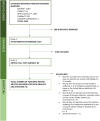Climate change, biodiversity loss, and Indigenous Peoples' health and wellbeing: A systematic umbrella review
- PMID: 38507404
- PMCID: PMC10954122
- DOI: 10.1371/journal.pgph.0002995
Climate change, biodiversity loss, and Indigenous Peoples' health and wellbeing: A systematic umbrella review
Abstract
Indigenous Peoples worldwide are experiencing a cascade of impacts on their health and wellbeing as a result of climate change and biodiversity loss. Existing literature at the interface of climate change, biodiversity loss, and Indigenous health tells us that Indigenous Peoples are among those most disproportionately and acutely affected by these impacts. Yet, a gap exists with respect to comprehensively and critically synthesizing the impacts reported across this literature and identifying Indigenous-led responses. Guided by an Indigenous advisory group, we employed a systematic umbrella review methodology, following PRISMA guidelines, to characterize the global secondary literature (PROSPERO registration #: CRD42023417060). In so doing, we identified the proximal, intermediate, distal, and gendered impacts of climate change and biodiversity loss on Indigenous health and wellbeing as well as Indigenous-led responses. Five databases were searched for published reviews, along with a grey literature search that focused on underrepresented geographic regions in the academic literature. Two independent reviewers conducted two-stage screening, data extraction, and quality assessment of retrieved records. Basic descriptive statistics were calculated. Qualitative data were analyzed thematically, using a constant comparative approach. A total of 38 review articles met the eligibility criteria and 37 grey literature records were retrieved and included in the review. Reviews were published between 2010-2023 and geographically clustered in the Circumpolar North. Intersecting proximal, intermediate, and distal impacts were characterized as place-based and specific, and linked to colonialism as an antecedent to and driver of these impacts. Gendered impacts were underexplored within reviews. Reviewed literature underscored the value of engaging diverse knowledge systems; platforming localized, community-led adaptation to climate change and biodiversity loss, while addressing sociopolitical constraints to these efforts; and applying a broader conceptualization of health that aligns with Indigenous frameworks. Going forward, we must foreground equity- and rights-based considerations within integrated responses to climate and biodiversity crises.
Copyright: © 2024 Brubacher et al. This is an open access article distributed under the terms of the Creative Commons Attribution License, which permits unrestricted use, distribution, and reproduction in any medium, provided the original author and source are credited.
Conflict of interest statement
The authors have declared that no competing interests exist.
Figures
Similar articles
-
Climate change, biodiversity loss, and Indigenous Peoples' health and wellbeing: a systematic umbrella review protocol.Syst Rev. 2024 Jan 2;13(1):8. doi: 10.1186/s13643-023-02423-x. Syst Rev. 2024. PMID: 38167217 Free PMC article.
-
Impact on mental health and wellbeing in Indigenous communities due to land loss resulting from industrial resource development: protocol for a systematic review.Syst Rev. 2022 Jul 20;11(1):146. doi: 10.1186/s13643-022-02014-2. Syst Rev. 2022. PMID: 35858926 Free PMC article.
-
Beyond the black stump: rapid reviews of health research issues affecting regional, rural and remote Australia.Med J Aust. 2020 Dec;213 Suppl 11:S3-S32.e1. doi: 10.5694/mja2.50881. Med J Aust. 2020. PMID: 33314144
-
Indigenous peoples and local community reports of climate change impacts on biodiversity.Conserv Biol. 2025 Apr 21:e70033. doi: 10.1111/cobi.70033. Online ahead of print. Conserv Biol. 2025. PMID: 40257179 Review.
-
Climate change and Indigenous mental health in the Circumpolar North: A systematic review to inform clinical practice.Transcult Psychiatry. 2022 Jun;59(3):312-336. doi: 10.1177/13634615211066698. Epub 2022 Jan 6. Transcult Psychiatry. 2022. PMID: 34989262 Free PMC article.
Cited by
-
Climate change and mental health: Position paper of the European Psychiatric Association.Eur Psychiatry. 2024 May 23;67(1):e41. doi: 10.1192/j.eurpsy.2024.1754. Eur Psychiatry. 2024. PMID: 38778031 Free PMC article. Review.
References
-
- Nesmith AA, Schmitz CL, Machado-Escudero Y, Billiot S, Forbes RA, Powers MCF, et al.. Climate Change, Ecology, and Justice. In: Nesmith AA, Schmitz CL, Machado-Escudero Y, Billiot S, Forbes RA, Powers MCF, et al.., editors. The intersection of environmental justice, climate change, community, and the ecology of life. Cham: Springer International Publishing; 2021. p. 1–12.
-
- Nikolakis W, Gay V, Nygaard A. The ‘environmental stewardship-health nexus’ among Indigenous peoples: a global systematic literature review. Wellbeing Space Soc. 2023;4:100121. doi: 10.1016/j.wss.2022.100121 - DOI
LinkOut - more resources
Full Text Sources
Miscellaneous

